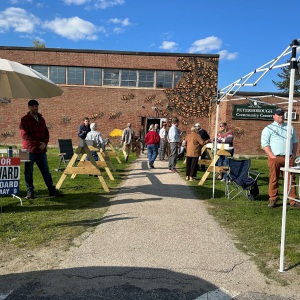Viewpoint: Robert Beck – Dangerous waters in the Red Sea

Robert Beck COURTESY PHOTO
|
Published: 01-22-2024 10:48 AM
Modified: 01-23-2024 11:16 AM |
It is a truism in the international affairs community that all major foreign policy actions create unintended consequences. One need look no further than the current tensions in the Red Sea to see the wisdom of that axiom.
With the launch of its retaliatory war against Hamas, Israel certainly did not intend to negatively affect global trade in a critical maritime choke point, the Bab al-Mandab, nearly 1,500 miles distant from the battlefields of Gaza. Nevertheless, that is exactly what has happened, in the process pulling the United States and its allies into a dangerous standoff with a little-understood foe.
The background is this – the Iran-backed Houthi group, which controls much of western Yemen, including the eastern side of the Bab al-Mandab strait connecting the Arabian and Red seas – the nautical gateway to the Suez Canal, is attacking international shipping in the region in support of Hamas’ war effort. Though the Houthis claim they are only targeting ships bound for Israel, the overall effect has called into question the safety of a trade route that carries, according to a recent report by the Atlantic Council, 20% of all global container shipping, nearly 10% of seaborne oil and 8% of liquefied natural gas.
The economic consequences of diverting all that maritime traffic around the southern tip of Africa will unquestionably be felt by consumers worldwide. The political and security repercussions of the attempted Houthi blockade, however, constitute the more long-lasting challenge to the international community. In that vein, America is leading a multinational naval force intent on keeping the strait open for shipping. This is prudent and responsible policy, as a world in which a relatively small group in a distant corner of the Earth can unilaterally disrupt global trade is a recipe for the tyranny of the minority on an international scale. Washington and its allies cannot abide such a scenario.
Some would argue that the West should step back and let China or Middle East oil-producing states handle the problem. Whether we like it or not, the United States remains the only country possessing the military, political and diplomatic power to carry out such a mission. In short, if we don’t do this, nobody will, and the entire world will suffer. The difficulty now is how to defend the global commons and maritime free trade, foundational economic building blocks of the U.S.-led international system, without getting dragged into another war in the Middle East.
Washington needs to tread very carefully to avoid the slippery slope to a deeper military commitment. As of this writing (Jan. 10, 2024), allied measures have so far been defensive in nature, shooting down attack drones and missiles emanating from Houthi positions in Yemen. If these attacks on commercial shipping continue, calls will undoubtedly grow for more “robust” military action to neutralize the Houthi launch sites and command and control facilities.
In the abstract, this may seem easy enough, but the Houthis are a battle-hardened group, having essentially defeated a Saudi-led coalition in a long-running war in Yemen over the past decade. U.S. and allied bombing raids will inevitably lead to Special Forces operations, which will likely result in American casualties and/or prisoners of war. And then what? Are we ready to support another ground war in the Middle East? Therefore, the Biden administration would be wise to use sufficient force to secure this critical piece of the maritime landscape without getting pulled into a wider conflict. If there’s one lesson we should have learned from our tragic experiences in Afghanistan and Iraq, it is the fact that it’s a lot easier to get into a war than to get out of one.
Robert Beck of Peterborough served for 30 years overseas with the United States government in embassies in Europe, the Middle East and Asia. He now teaches foreign policy classes at Keene State College’s Cheshire Academy for Lifelong Learning.
Article continues after...
Yesterday's Most Read Articles
 Spellers strut their stuff at inaugural Greenfield Spelling Bee
Spellers strut their stuff at inaugural Greenfield Spelling Bee
 Meet the candidates in this year’s Peterborough town election
Meet the candidates in this year’s Peterborough town election
 Mary Lawler remembered for a life of service
Mary Lawler remembered for a life of service
 ConVal track and field makes its one home meet count
ConVal track and field makes its one home meet count
 PHOTOS: The Farm at Wolf Pine Hollow holds TulipFête 2024
PHOTOS: The Farm at Wolf Pine Hollow holds TulipFête 2024


